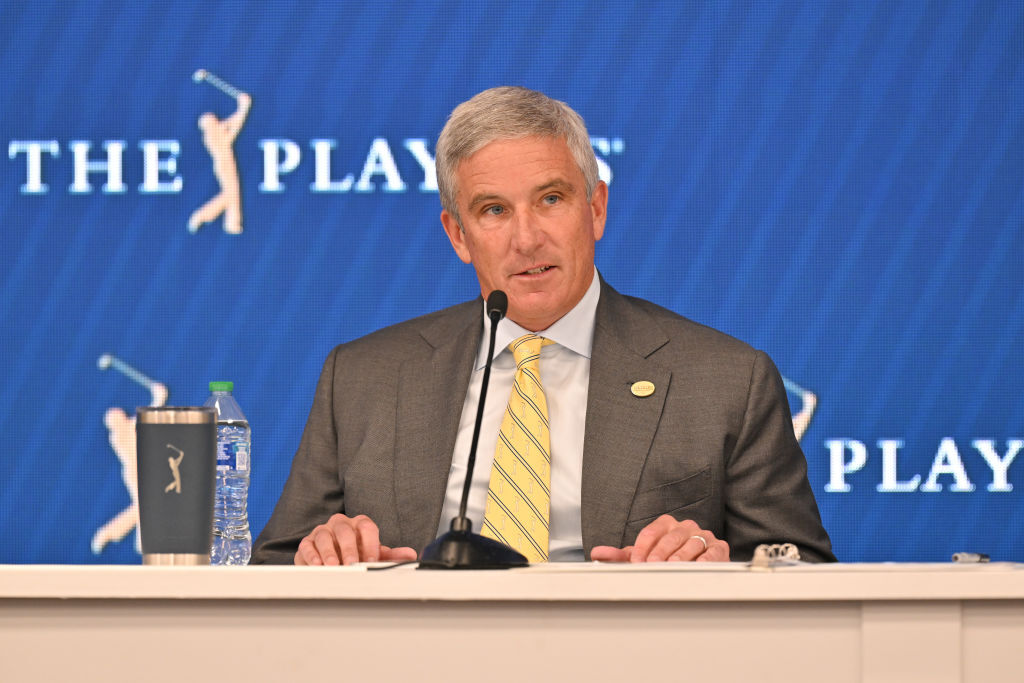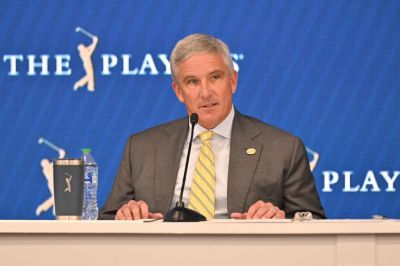Last week’s shocking announcement that the PGA Tour will merge with the Saudi Arabia-backed LIV Golf league ends hostilities between the two organizations and boosts Saudi Arabia’s ambitions in the sport.
But the deal—which angered both PGA players and fans—has yet to be finalized and faces lots more questions.
What is LIV Golf?
One year ago, LIV hosted its first tournament outside London, a symbolic opening shot in the golf world civil war. With financing from Saudi Arabia, the rebel league enticed PGA players—including Phil Mickelson, Dustin Johnson, and Brooks Koepka—with hundreds of millions in deals. The PGA Tour responded by suspending the memberships of the defectors, with superstars such as Rory McIlroy and Tiger Woods lobbying players to stay. “What they’ve done is they’ve turned their back on what has allowed them to get to this position,” Woods said last July.
LIV players faced criticism for legitimizing a “sportswashing” effort by a country that has an abysmal human rights record, assassinated a Washington Post journalist, and had ties to the 9/11 terrorists. Groups representing families who lost loved ones on 9/11 called their decision a “betrayal.”
Mickelson openly recognized Saudi Arabia’s wrongdoings. “They’re scary mother------ to get involved with,” he said. “We know they killed Khashoggi and have a horrible record on human rights. They execute people over there for being gay.” So why join? “Because this is a once-in-a-lifetime opportunity to reshape how the PGA Tour operates.”
The hostile split is what made the PGA Tour’s reversal last week so stunning. Few people in the golf world who were not a party to the secret meetings that preceded the announcement had any forewarning, including PGA players themselves. McIlroy was told early the morning of the announcement. Collin Morikawa—along with a number of other players—saw the news on Twitter.
While LIV players took a victory lap on social media, PGA players vented their frustrations at a private meeting with PGA Commissioner Jay Monahan on June 6, reportedly labeling the commissioner a hypocrite and applauding calls for new leadership. Others did too. “PGA Tour leaders should be ashamed of their hypocrisy and greed,” 9/11 Families United said in a statement. “Our entire 9/11 community has been betrayed by Commissioner Monahan and the PGA as it appears their concern for our loved ones was merely window-dressing in their quest for money.”
How will the new entity operate?
Monahan and Yasir Al-Rumayyan, the governor of Saudi Arabia’s Public Investment Fund (PIF) told CNBC that a new entity—referred to as NewCo for now—will become an umbrella organization for the PGA Tour, LIV Golf, and the DP World Tour (also known as the European Tour), which will continue to run their own events for the foreseeable future. The agreement will also end the ongoing litigation between the groups.
The PIF is expected to spend significantly on NewCo as the exclusive investor, with Al-Rumayyan serving as chairman of the board. The new organization will be a for-profit venture but leave in place the PGA Tour’s current status as a tax-exempt nonprofit—the tour’s commercial assets including broadcasting rights will transfer to the new organization. Monahan will serve as NewCo’s CEO, while the PGA Tour will appoint a majority of NewCo’s board members and hold a majority voting interest.
Will LIV and the PGA Tour continue as two leagues but allow players to shift between them? That remains unclear. Last week’s announcement alludes to team play formats being a larger focus and says that LIV players will be able to reapply for membership with the PGA and DP World Tours at the end of the 2023 season, and Monahan has suggested that LIV may not continue to exist in its current form. And late last week Jimmy Dunne, a member of the PGA Tour policy board who brokered the beginning of talks with PIF, said the players who stayed with the tour will receive equity in the new company, but LIV players will not. He also suggested if LIV ends, players looking to return to the PGA Tour would face some kind of yet-to-be-determined penalty. Beyond that, details are sparse.
Valuation of each organization’s assets will be the merger’s next step, Al-Rumayyan said. The PGA Tour policy board also has to approve the deal—far from a done deal as five board members are tour players.
Will the deal face any challenges?
Some observers have speculated the timing and nature of the announcement is a way to end ongoing litigation between the groups that otherwise would have lasted years.
The PIF and Al-Rumayyan were on a path to potentially be forced to submit to discovery and depositions in the antitrust lawsuit LIV brought against the PGA Tour last year. “And what I think probably would have driven them to a settlement more than anything is if they knew that they were on the verge of being subject to discovery,” John Nucci, an attorney at Woods Oviatt Gilman who specializes in sports law, tells The Dispatch. “Not that any entity or corporation wants to open their books and turn over their emails and communications and texts, but certainly not one that is associated with a sovereign wealth fund that … historically keeps things close to the vest.”
The PGA Tour faced a potentially years-long court battle and a continued rivalry with a league that has no shortage of funding from Saudi Arabia. Monahan told stafers in a meeting that the tour had spent nearly $50 million on legal bills and had drawn $100 million out of its reserves to pay for increased purse prizes, according to reporting from the Wall Street Journal. “We cannot compete with a foreign government with unlimited money,” Monhan reportedly said.
Yet once a final deal is reached, the new entity could face antitrust issues of its own. Filings in LIV’s lawsuit against the PGA Tour alleging anti-competitive behavior described the tour as an “entrenched monopolist.”
“It’s going to be very hard after LIV Golf has spent a year litigating and claiming the PGA Tour is a monopoly to then turn around and claim their merger with the PGA Tour would not substantially lessen competition in a relevant market,” Marc Edelman, a law professor and sports and antitrust law specialist at Baruch College, argued last week. The Department of Justice has already been investigating the PGA Tour since last summer for LIV-related antitrust violations.
Capitol Hill has begun to scrutinize the deal too. Sen. Richard Blumenthal, a Democrat of Connecticut, announced an investigation into the agreement Monday. The deal “raises concerns about the Saudi government’s role in influencing this effort and the risks posed by a foreign government entity assuming control over a cherished American institution,” Blumenthal wrote in a letter to Monahan. The senator is requesting the PGA Tour and LIV hand over communications and records related to the deal.
Despite the merger’s pitfalls, some golf observers see the unification as a boon to the game. The division between the two leagues split the field among some of the league’s top competitors—LIV players have appeared alongside tour players only at the four major championships. “Golf was never big enough for two warring entities,” said Dan Rapaport, a golf writer at Barstool Sports. “You were never gonna be able to have two proper leagues that were flourishing.”
And PIF has infused a huge amount of cash into the game, a move that effectively drove the PGA Tour to increase its purse prizes—something heralded by players. Moving forward, the PGA Tour will now help direct the flow of PIF funds. “Whether you like it or not, the PIF were gonna keep spending money in golf,” McIlroy said Wednesday. “At least the PGA now controls how that money is spent.” The $600 billion sitting in the PIF sovereign wealth fund has enabled the country to take out stakes in not only golf, but also soccer, formula one racing, and boxing.
McIlroy had been critical of golfers taking LIV money. But last week the Irish golfer appeared resigned to the new reality. “If you’re thinking about one of the biggest sovereign wealth funds in the world, would you rather have them as a partner or an enemy?” he said. “At the end of the day, money talks, and you’d rather have them as a partner.”







Please note that we at The Dispatch hold ourselves, our work, and our commenters to a higher standard than other places on the internet. We welcome comments that foster genuine debate or discussion—including comments critical of us or our work—but responses that include ad hominem attacks on fellow Dispatch members or are intended to stoke fear and anger may be moderated.
With your membership, you only have the ability to comment on The Morning Dispatch articles. Consider upgrading to join the conversation everywhere.